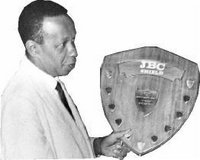Gleaner remembers Wycliffe Bennett
Published: Friday | October 9, 2009

BENNETT
Since his death on Monday at age 87, persons familiar with Wycliffe Bennett have hailed his role in the development of modern Jamaican theatre. But he was general manager of the Jamaica Broadcasting Corporation (JBC) in 1981 when arguably the most controversial episode in local journalism took place.
In February that year, the new Jamaica Labour Party (JLP) government fired the entire newsroom, reportedly because of their ties to Michael Manley's People's National Party (PNP), which was in power from 1972 to October 1980.
The Panama-born Bennett was appointed general manager by Manley in 1976.
He was caught in the crossfire when the new administration, led by Edward Seaga, assumed power in late 1980.
According to Colin Campbell, then an editor at the JBC, the staff initially felt Bennett had hung them out to dry.
"At first we thought he didn't give us any support but we found out later that, in fact, he gave an affidavit which supported us," Campbell told The Gleaner.
In a 1999 interview, Bennett commented on the issue.
"When the lawyers for the other side maintained that the newsroom was incompetent, I told them I could not support that, and gave an affidavit stating such," he said.
Bennett resigned in April 1981, 10 years after his first stint at the troubled station ended.
He was first appointed general manager of the JBC in 1968 under the JLP.
When he left three years later, Bennett returned to producing extravagant events such as the 1972 centenary of Kingston as Jamaica's capital. In 1976, he was lead organiser of CARIFESTA, a 10-day panorama at the National Stadium that attracted 35 countries.
Bennett said Manley was so impressed with CARIFESTA that he asked him to once again take the reins at the JBC. The station was far different from what he left in 1971, as the newsroom had a number of hot-blooded reporters, including Hopeton Dunn, Brian Meeks and Campbell. The feisty Headley Bernard was head of the newsroom, which also had Consie Walters and John Maxwell as senior editors.
"At the time, the newsroom was perceived as pro-Government but that was inaccurate. I believe it just had young, aggressive reporters," Campbell said. He added that Bennett had little impact on editorial content.
"Occasionally, he had spats with us but I can't recall any major issues with him. He was a culture-oriented person, and spent a lot of time on programmes like music and youth," Campbell recalled.
The JBC was one one of the hot spots of the turbulent 1970s, when it was consistently targeted by the JLP for supporting Manley's socialist policies. Bennett said he was used to that type of pressure.
"If you are general manager at the JBC when the PNP is in power, the JLP will claim bias. Whenever the other side is in, the same thing happens," he stated.
Following the JLP's landslide victory in the bloody October 1980 election, the JBC newsroom was purged. Even respected broadcaster Charles Hyatt, who hosted the popular Here Comes Charlie radio show, got the axe.
In a 1997 interview, Hyatt commented on the incident: "It set journalism in this country back 30 years."
In the court case that followed, the JBC was ordered to pay its 13 former workers $500,000 each for wrongful dismissal in March 1982.
Manley appointed Bennett chairman of the Creative Production and Training Centre when the PNP won the general election in 1989. He stepped down that same year.
This article is, in large part, a reprint of one carried in 1999.







